Analysis of Starbucks' Ethics and Sustainability Marketing Strategies
VerifiedAdded on 2021/07/20
|19
|4358
|76
Essay
AI Summary
This essay provides a comprehensive analysis of Starbucks' approach to ethics and sustainability marketing. It begins with an overview of Starbucks' history, stakeholders, and the challenges it faces within the coffee industry, including environmental concerns and social issues such as fair pricing, labor practices, and racial discrimination. The essay examines Starbucks' sustainability and ethical profile, including its Corporate Social Responsibility (CSR) initiatives, cause-related marketing (CRM) efforts, and Fairtrade partnerships. It also explores consumer perceptions and interpretations of the company's actions. The essay then discusses criticisms of Starbucks' practices, such as tax avoidance and challenges related to recyclable cups. Finally, the essay aims to provide recommendations for Starbucks' future marketing strategy, emphasizing the importance of sustainability marketing and ethical considerations in building relationships with customers and stakeholders.
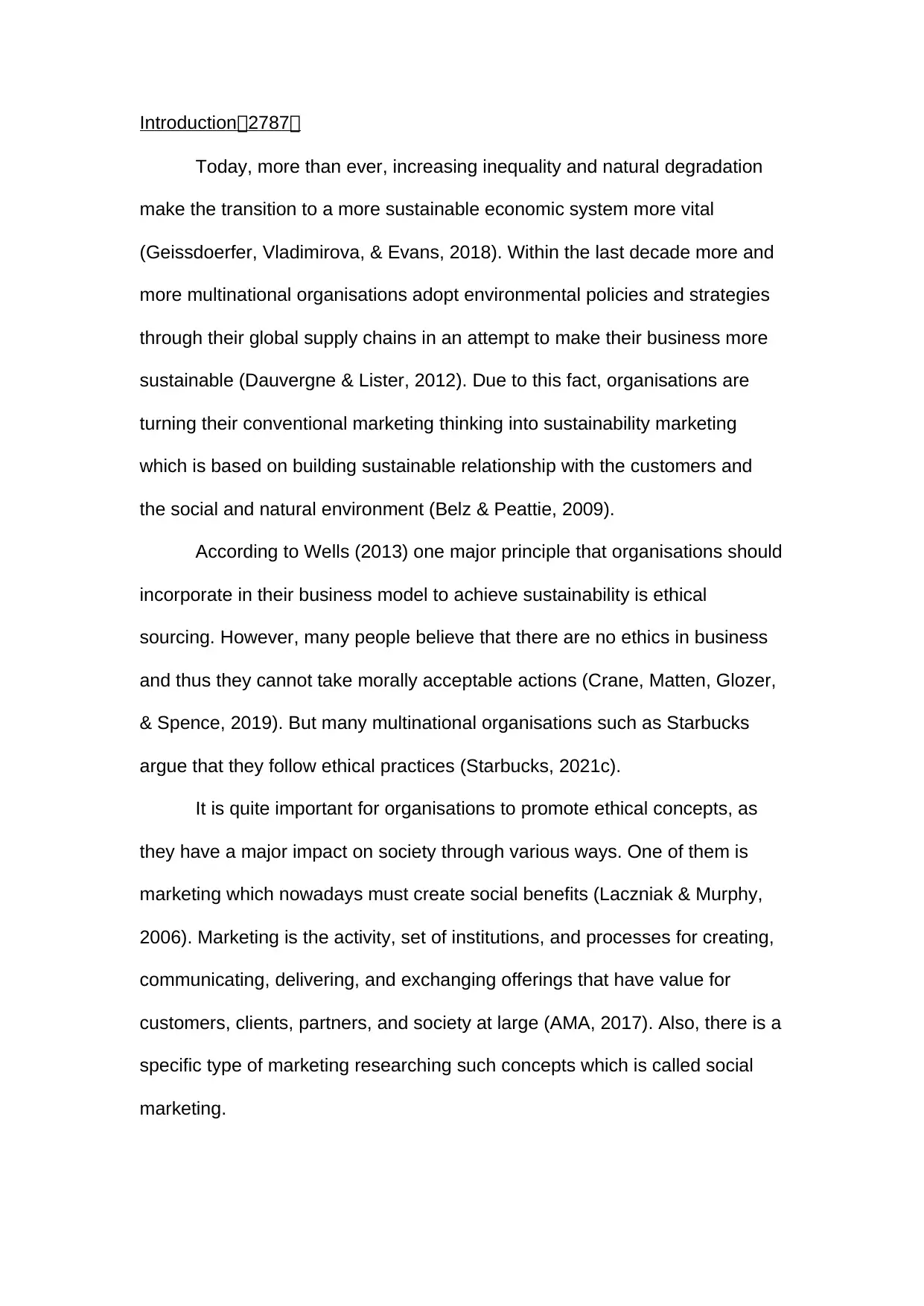
Introduction(2787(
Today, more than ever, increasing inequality and natural degradation
make the transition to a more sustainable economic system more vital
(Geissdoerfer, Vladimirova, & Evans, 2018). Within the last decade more and
more multinational organisations adopt environmental policies and strategies
through their global supply chains in an attempt to make their business more
sustainable (Dauvergne & Lister, 2012). Due to this fact, organisations are
turning their conventional marketing thinking into sustainability marketing
which is based on building sustainable relationship with the customers and
the social and natural environment (Belz & Peattie, 2009).
According to Wells (2013) one major principle that organisations should
incorporate in their business model to achieve sustainability is ethical
sourcing. However, many people believe that there are no ethics in business
and thus they cannot take morally acceptable actions (Crane, Matten, Glozer,
& Spence, 2019). But many multinational organisations such as Starbucks
argue that they follow ethical practices (Starbucks, 2021c).
It is quite important for organisations to promote ethical concepts, as
they have a major impact on society through various ways. One of them is
marketing which nowadays must create social benefits (Laczniak & Murphy,
2006). Marketing is the activity, set of institutions, and processes for creating,
communicating, delivering, and exchanging offerings that have value for
customers, clients, partners, and society at large (AMA, 2017). Also, there is a
specific type of marketing researching such concepts which is called social
marketing.
Today, more than ever, increasing inequality and natural degradation
make the transition to a more sustainable economic system more vital
(Geissdoerfer, Vladimirova, & Evans, 2018). Within the last decade more and
more multinational organisations adopt environmental policies and strategies
through their global supply chains in an attempt to make their business more
sustainable (Dauvergne & Lister, 2012). Due to this fact, organisations are
turning their conventional marketing thinking into sustainability marketing
which is based on building sustainable relationship with the customers and
the social and natural environment (Belz & Peattie, 2009).
According to Wells (2013) one major principle that organisations should
incorporate in their business model to achieve sustainability is ethical
sourcing. However, many people believe that there are no ethics in business
and thus they cannot take morally acceptable actions (Crane, Matten, Glozer,
& Spence, 2019). But many multinational organisations such as Starbucks
argue that they follow ethical practices (Starbucks, 2021c).
It is quite important for organisations to promote ethical concepts, as
they have a major impact on society through various ways. One of them is
marketing which nowadays must create social benefits (Laczniak & Murphy,
2006). Marketing is the activity, set of institutions, and processes for creating,
communicating, delivering, and exchanging offerings that have value for
customers, clients, partners, and society at large (AMA, 2017). Also, there is a
specific type of marketing researching such concepts which is called social
marketing.
Paraphrase This Document
Need a fresh take? Get an instant paraphrase of this document with our AI Paraphraser
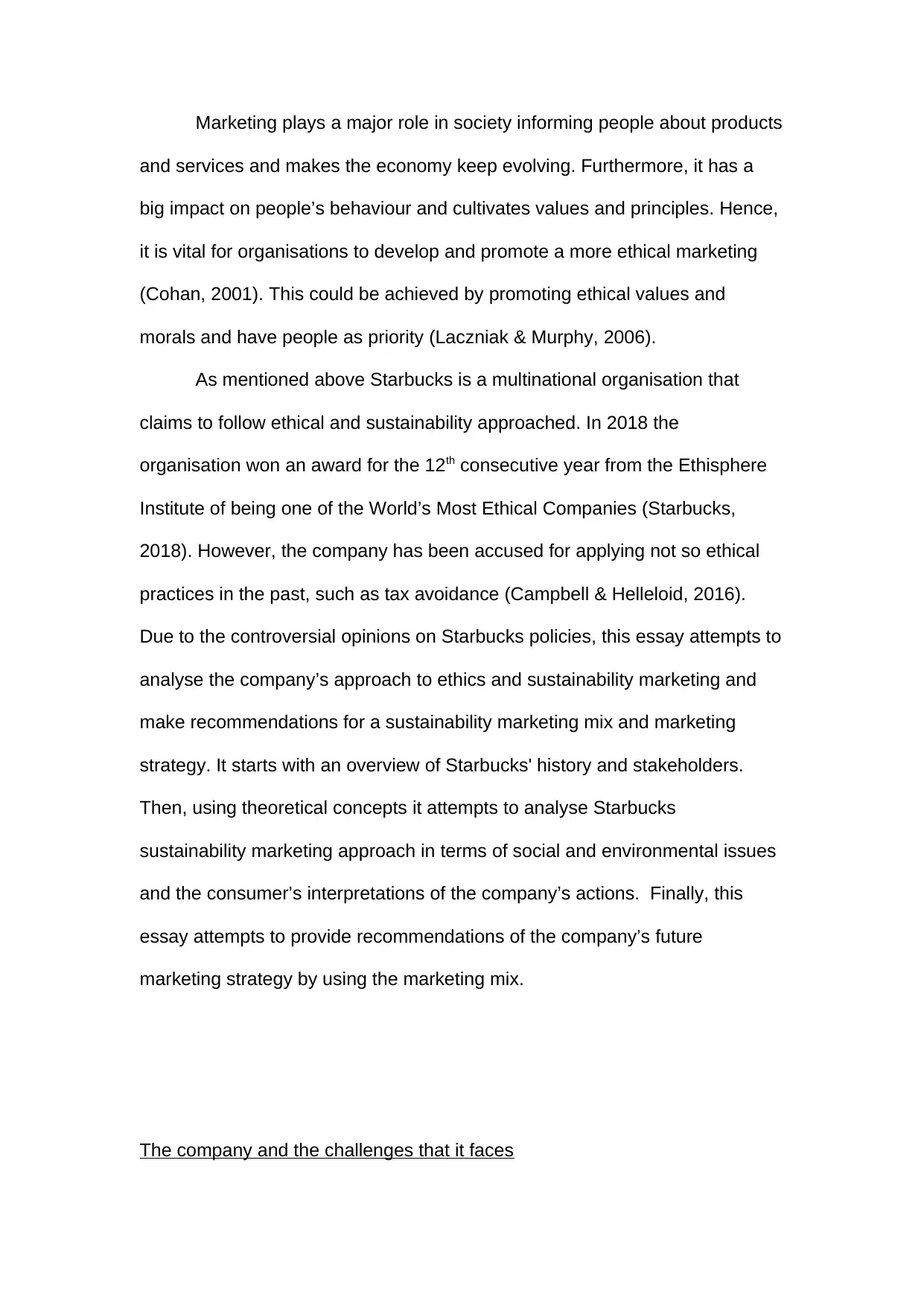
Marketing plays a major role in society informing people about products
and services and makes the economy keep evolving. Furthermore, it has a
big impact on people’s behaviour and cultivates values and principles. Hence,
it is vital for organisations to develop and promote a more ethical marketing
(Cohan, 2001). This could be achieved by promoting ethical values and
morals and have people as priority (Laczniak & Murphy, 2006).
As mentioned above Starbucks is a multinational organisation that
claims to follow ethical and sustainability approached. In 2018 the
organisation won an award for the 12th consecutive year from the Ethisphere
Institute of being one of the World’s Most Ethical Companies (Starbucks,
2018). However, the company has been accused for applying not so ethical
practices in the past, such as tax avoidance (Campbell & Helleloid, 2016).
Due to the controversial opinions on Starbucks policies, this essay attempts to
analyse the company’s approach to ethics and sustainability marketing and
make recommendations for a sustainability marketing mix and marketing
strategy. It starts with an overview of Starbucks' history and stakeholders.
Then, using theoretical concepts it attempts to analyse Starbucks
sustainability marketing approach in terms of social and environmental issues
and the consumer’s interpretations of the company’s actions. Finally, this
essay attempts to provide recommendations of the company’s future
marketing strategy by using the marketing mix.
The company and the challenges that it faces
and services and makes the economy keep evolving. Furthermore, it has a
big impact on people’s behaviour and cultivates values and principles. Hence,
it is vital for organisations to develop and promote a more ethical marketing
(Cohan, 2001). This could be achieved by promoting ethical values and
morals and have people as priority (Laczniak & Murphy, 2006).
As mentioned above Starbucks is a multinational organisation that
claims to follow ethical and sustainability approached. In 2018 the
organisation won an award for the 12th consecutive year from the Ethisphere
Institute of being one of the World’s Most Ethical Companies (Starbucks,
2018). However, the company has been accused for applying not so ethical
practices in the past, such as tax avoidance (Campbell & Helleloid, 2016).
Due to the controversial opinions on Starbucks policies, this essay attempts to
analyse the company’s approach to ethics and sustainability marketing and
make recommendations for a sustainability marketing mix and marketing
strategy. It starts with an overview of Starbucks' history and stakeholders.
Then, using theoretical concepts it attempts to analyse Starbucks
sustainability marketing approach in terms of social and environmental issues
and the consumer’s interpretations of the company’s actions. Finally, this
essay attempts to provide recommendations of the company’s future
marketing strategy by using the marketing mix.
The company and the challenges that it faces
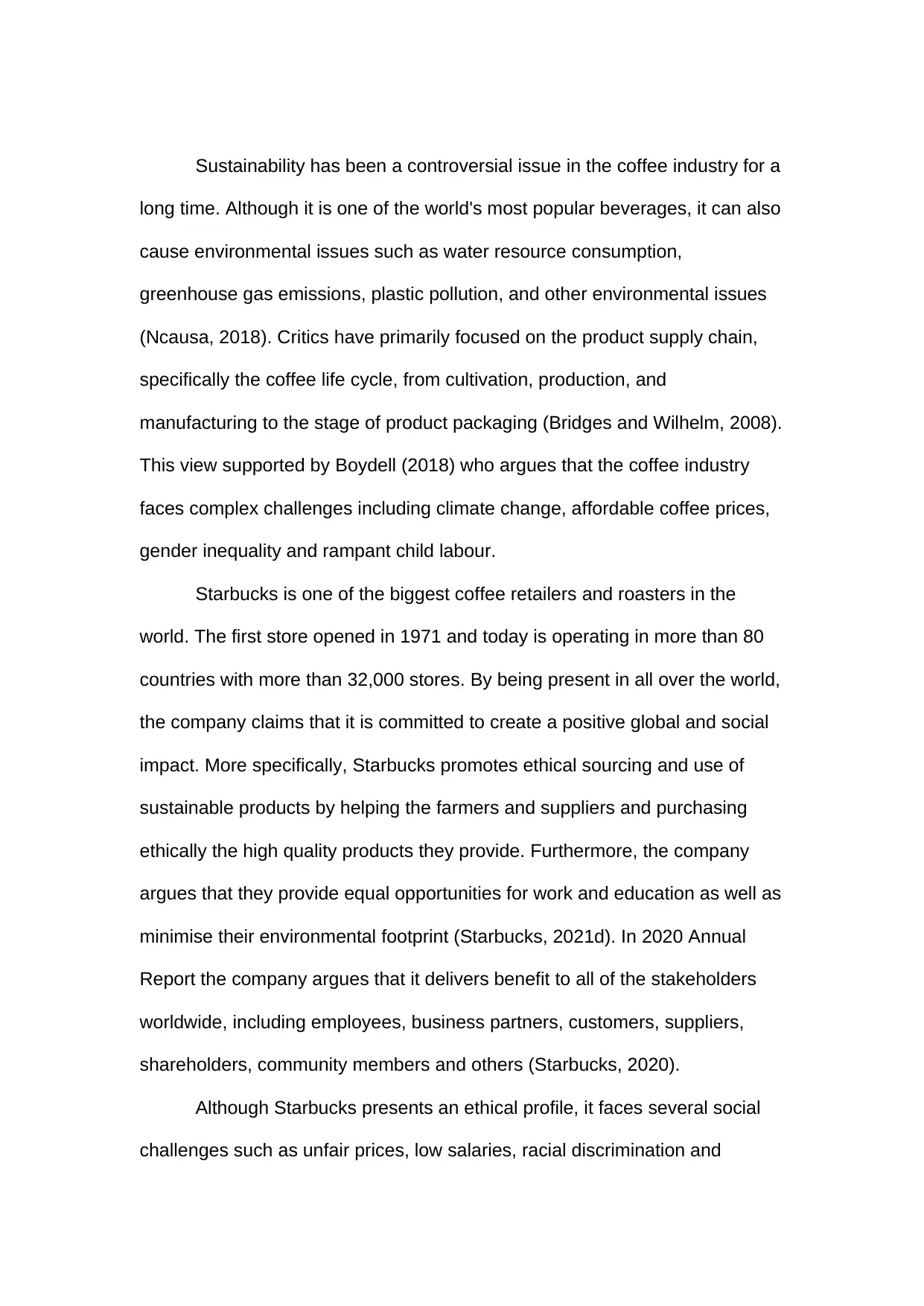
Sustainability has been a controversial issue in the coffee industry for a
long time. Although it is one of the world's most popular beverages, it can also
cause environmental issues such as water resource consumption,
greenhouse gas emissions, plastic pollution, and other environmental issues
(Ncausa, 2018). Critics have primarily focused on the product supply chain,
specifically the coffee life cycle, from cultivation, production, and
manufacturing to the stage of product packaging (Bridges and Wilhelm, 2008).
This view supported by Boydell (2018) who argues that the coffee industry
faces complex challenges including climate change, affordable coffee prices,
gender inequality and rampant child labour.
Starbucks is one of the biggest coffee retailers and roasters in the
world. The first store opened in 1971 and today is operating in more than 80
countries with more than 32,000 stores. By being present in all over the world,
the company claims that it is committed to create a positive global and social
impact. More specifically, Starbucks promotes ethical sourcing and use of
sustainable products by helping the farmers and suppliers and purchasing
ethically the high quality products they provide. Furthermore, the company
argues that they provide equal opportunities for work and education as well as
minimise their environmental footprint (Starbucks, 2021d). In 2020 Annual
Report the company argues that it delivers benefit to all of the stakeholders
worldwide, including employees, business partners, customers, suppliers,
shareholders, community members and others (Starbucks, 2020).
Although Starbucks presents an ethical profile, it faces several social
challenges such as unfair prices, low salaries, racial discrimination and
long time. Although it is one of the world's most popular beverages, it can also
cause environmental issues such as water resource consumption,
greenhouse gas emissions, plastic pollution, and other environmental issues
(Ncausa, 2018). Critics have primarily focused on the product supply chain,
specifically the coffee life cycle, from cultivation, production, and
manufacturing to the stage of product packaging (Bridges and Wilhelm, 2008).
This view supported by Boydell (2018) who argues that the coffee industry
faces complex challenges including climate change, affordable coffee prices,
gender inequality and rampant child labour.
Starbucks is one of the biggest coffee retailers and roasters in the
world. The first store opened in 1971 and today is operating in more than 80
countries with more than 32,000 stores. By being present in all over the world,
the company claims that it is committed to create a positive global and social
impact. More specifically, Starbucks promotes ethical sourcing and use of
sustainable products by helping the farmers and suppliers and purchasing
ethically the high quality products they provide. Furthermore, the company
argues that they provide equal opportunities for work and education as well as
minimise their environmental footprint (Starbucks, 2021d). In 2020 Annual
Report the company argues that it delivers benefit to all of the stakeholders
worldwide, including employees, business partners, customers, suppliers,
shareholders, community members and others (Starbucks, 2020).
Although Starbucks presents an ethical profile, it faces several social
challenges such as unfair prices, low salaries, racial discrimination and
⊘ This is a preview!⊘
Do you want full access?
Subscribe today to unlock all pages.

Trusted by 1+ million students worldwide
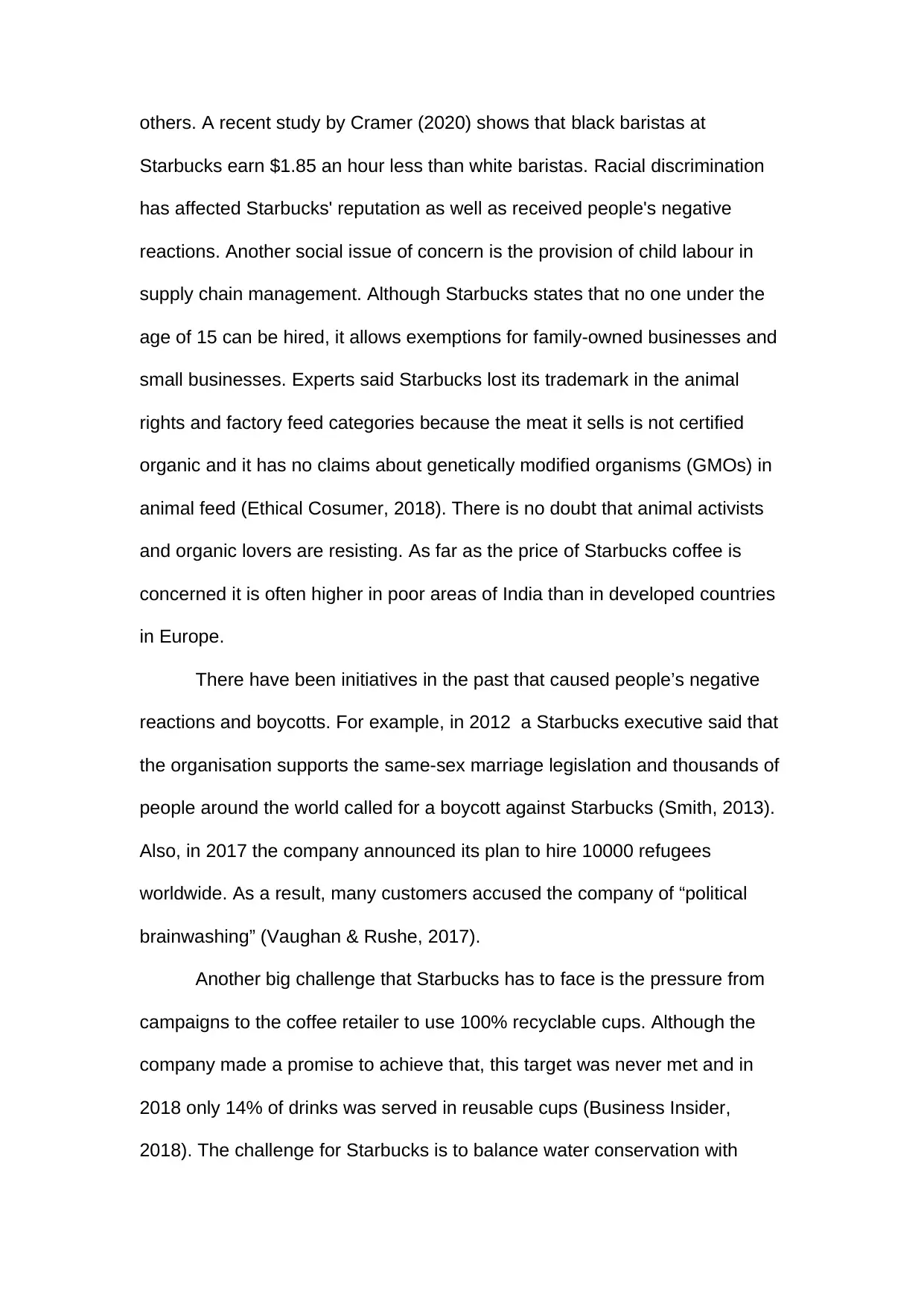
others. A recent study by Cramer (2020) shows that black baristas at
Starbucks earn $1.85 an hour less than white baristas. Racial discrimination
has affected Starbucks' reputation as well as received people's negative
reactions. Another social issue of concern is the provision of child labour in
supply chain management. Although Starbucks states that no one under the
age of 15 can be hired, it allows exemptions for family-owned businesses and
small businesses. Experts said Starbucks lost its trademark in the animal
rights and factory feed categories because the meat it sells is not certified
organic and it has no claims about genetically modified organisms (GMOs) in
animal feed (Ethical Cosumer, 2018). There is no doubt that animal activists
and organic lovers are resisting. As far as the price of Starbucks coffee is
concerned it is often higher in poor areas of India than in developed countries
in Europe.
There have been initiatives in the past that caused people’s negative
reactions and boycotts. For example, in 2012 a Starbucks executive said that
the organisation supports the same-sex marriage legislation and thousands of
people around the world called for a boycott against Starbucks (Smith, 2013).
Also, in 2017 the company announced its plan to hire 10000 refugees
worldwide. As a result, many customers accused the company of “political
brainwashing” (Vaughan & Rushe, 2017).
Another big challenge that Starbucks has to face is the pressure from
campaigns to the coffee retailer to use 100% recyclable cups. Although the
company made a promise to achieve that, this target was never met and in
2018 only 14% of drinks was served in reusable cups (Business Insider,
2018). The challenge for Starbucks is to balance water conservation with
Starbucks earn $1.85 an hour less than white baristas. Racial discrimination
has affected Starbucks' reputation as well as received people's negative
reactions. Another social issue of concern is the provision of child labour in
supply chain management. Although Starbucks states that no one under the
age of 15 can be hired, it allows exemptions for family-owned businesses and
small businesses. Experts said Starbucks lost its trademark in the animal
rights and factory feed categories because the meat it sells is not certified
organic and it has no claims about genetically modified organisms (GMOs) in
animal feed (Ethical Cosumer, 2018). There is no doubt that animal activists
and organic lovers are resisting. As far as the price of Starbucks coffee is
concerned it is often higher in poor areas of India than in developed countries
in Europe.
There have been initiatives in the past that caused people’s negative
reactions and boycotts. For example, in 2012 a Starbucks executive said that
the organisation supports the same-sex marriage legislation and thousands of
people around the world called for a boycott against Starbucks (Smith, 2013).
Also, in 2017 the company announced its plan to hire 10000 refugees
worldwide. As a result, many customers accused the company of “political
brainwashing” (Vaughan & Rushe, 2017).
Another big challenge that Starbucks has to face is the pressure from
campaigns to the coffee retailer to use 100% recyclable cups. Although the
company made a promise to achieve that, this target was never met and in
2018 only 14% of drinks was served in reusable cups (Business Insider,
2018). The challenge for Starbucks is to balance water conservation with
Paraphrase This Document
Need a fresh take? Get an instant paraphrase of this document with our AI Paraphraser
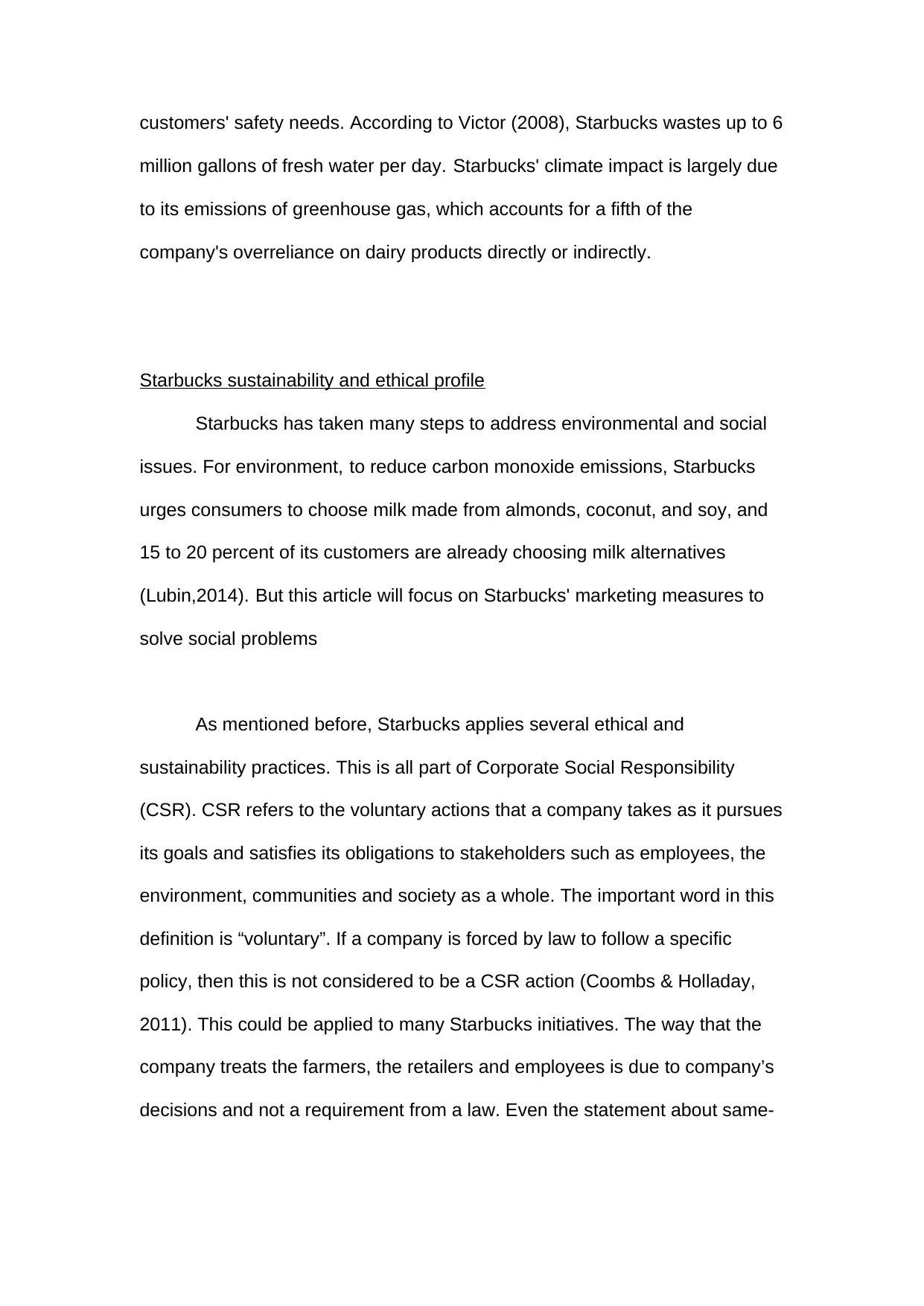
customers' safety needs. According to Victor (2008), Starbucks wastes up to 6
million gallons of fresh water per day. Starbucks' climate impact is largely due
to its emissions of greenhouse gas, which accounts for a fifth of the
company's overreliance on dairy products directly or indirectly.
Starbucks sustainability and ethical profile
Starbucks has taken many steps to address environmental and social
issues. For environment, to reduce carbon monoxide emissions, Starbucks
urges consumers to choose milk made from almonds, coconut, and soy, and
15 to 20 percent of its customers are already choosing milk alternatives
(Lubin,2014). But this article will focus on Starbucks' marketing measures to
solve social problems
As mentioned before, Starbucks applies several ethical and
sustainability practices. This is all part of Corporate Social Responsibility
(CSR). CSR refers to the voluntary actions that a company takes as it pursues
its goals and satisfies its obligations to stakeholders such as employees, the
environment, communities and society as a whole. The important word in this
definition is “voluntary”. If a company is forced by law to follow a specific
policy, then this is not considered to be a CSR action (Coombs & Holladay,
2011). This could be applied to many Starbucks initiatives. The way that the
company treats the farmers, the retailers and employees is due to company’s
decisions and not a requirement from a law. Even the statement about same-
million gallons of fresh water per day. Starbucks' climate impact is largely due
to its emissions of greenhouse gas, which accounts for a fifth of the
company's overreliance on dairy products directly or indirectly.
Starbucks sustainability and ethical profile
Starbucks has taken many steps to address environmental and social
issues. For environment, to reduce carbon monoxide emissions, Starbucks
urges consumers to choose milk made from almonds, coconut, and soy, and
15 to 20 percent of its customers are already choosing milk alternatives
(Lubin,2014). But this article will focus on Starbucks' marketing measures to
solve social problems
As mentioned before, Starbucks applies several ethical and
sustainability practices. This is all part of Corporate Social Responsibility
(CSR). CSR refers to the voluntary actions that a company takes as it pursues
its goals and satisfies its obligations to stakeholders such as employees, the
environment, communities and society as a whole. The important word in this
definition is “voluntary”. If a company is forced by law to follow a specific
policy, then this is not considered to be a CSR action (Coombs & Holladay,
2011). This could be applied to many Starbucks initiatives. The way that the
company treats the farmers, the retailers and employees is due to company’s
decisions and not a requirement from a law. Even the statement about same-
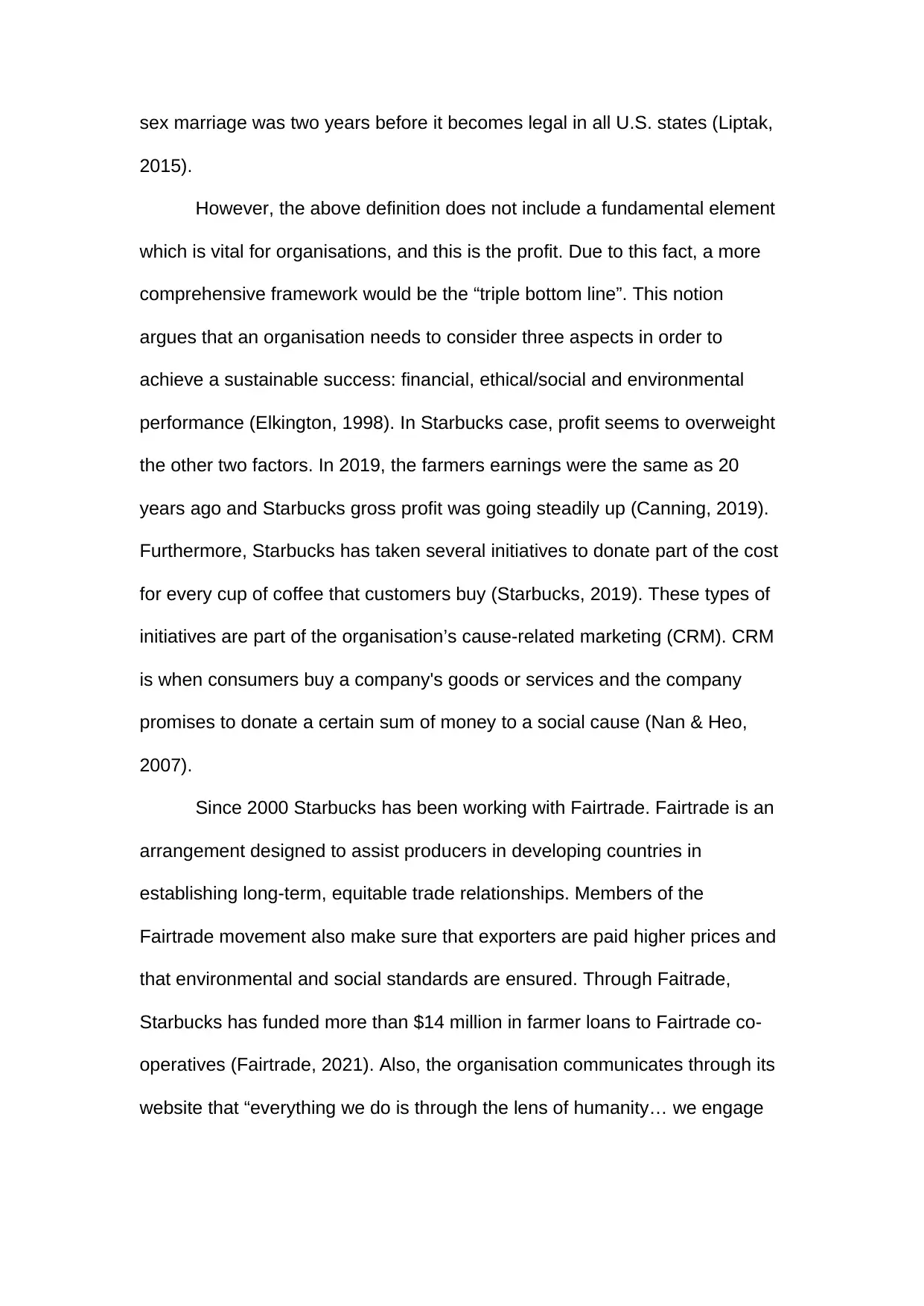
sex marriage was two years before it becomes legal in all U.S. states (Liptak,
2015).
However, the above definition does not include a fundamental element
which is vital for organisations, and this is the profit. Due to this fact, a more
comprehensive framework would be the “triple bottom line”. This notion
argues that an organisation needs to consider three aspects in order to
achieve a sustainable success: financial, ethical/social and environmental
performance (Elkington, 1998). In Starbucks case, profit seems to overweight
the other two factors. In 2019, the farmers earnings were the same as 20
years ago and Starbucks gross profit was going steadily up (Canning, 2019).
Furthermore, Starbucks has taken several initiatives to donate part of the cost
for every cup of coffee that customers buy (Starbucks, 2019). These types of
initiatives are part of the organisation’s cause-related marketing (CRM). CRM
is when consumers buy a company's goods or services and the company
promises to donate a certain sum of money to a social cause (Nan & Heo,
2007).
Since 2000 Starbucks has been working with Fairtrade. Fairtrade is an
arrangement designed to assist producers in developing countries in
establishing long-term, equitable trade relationships. Members of the
Fairtrade movement also make sure that exporters are paid higher prices and
that environmental and social standards are ensured. Through Faitrade,
Starbucks has funded more than $14 million in farmer loans to Fairtrade co-
operatives (Fairtrade, 2021). Also, the organisation communicates through its
website that “everything we do is through the lens of humanity… we engage
2015).
However, the above definition does not include a fundamental element
which is vital for organisations, and this is the profit. Due to this fact, a more
comprehensive framework would be the “triple bottom line”. This notion
argues that an organisation needs to consider three aspects in order to
achieve a sustainable success: financial, ethical/social and environmental
performance (Elkington, 1998). In Starbucks case, profit seems to overweight
the other two factors. In 2019, the farmers earnings were the same as 20
years ago and Starbucks gross profit was going steadily up (Canning, 2019).
Furthermore, Starbucks has taken several initiatives to donate part of the cost
for every cup of coffee that customers buy (Starbucks, 2019). These types of
initiatives are part of the organisation’s cause-related marketing (CRM). CRM
is when consumers buy a company's goods or services and the company
promises to donate a certain sum of money to a social cause (Nan & Heo,
2007).
Since 2000 Starbucks has been working with Fairtrade. Fairtrade is an
arrangement designed to assist producers in developing countries in
establishing long-term, equitable trade relationships. Members of the
Fairtrade movement also make sure that exporters are paid higher prices and
that environmental and social standards are ensured. Through Faitrade,
Starbucks has funded more than $14 million in farmer loans to Fairtrade co-
operatives (Fairtrade, 2021). Also, the organisation communicates through its
website that “everything we do is through the lens of humanity… we engage
⊘ This is a preview!⊘
Do you want full access?
Subscribe today to unlock all pages.

Trusted by 1+ million students worldwide
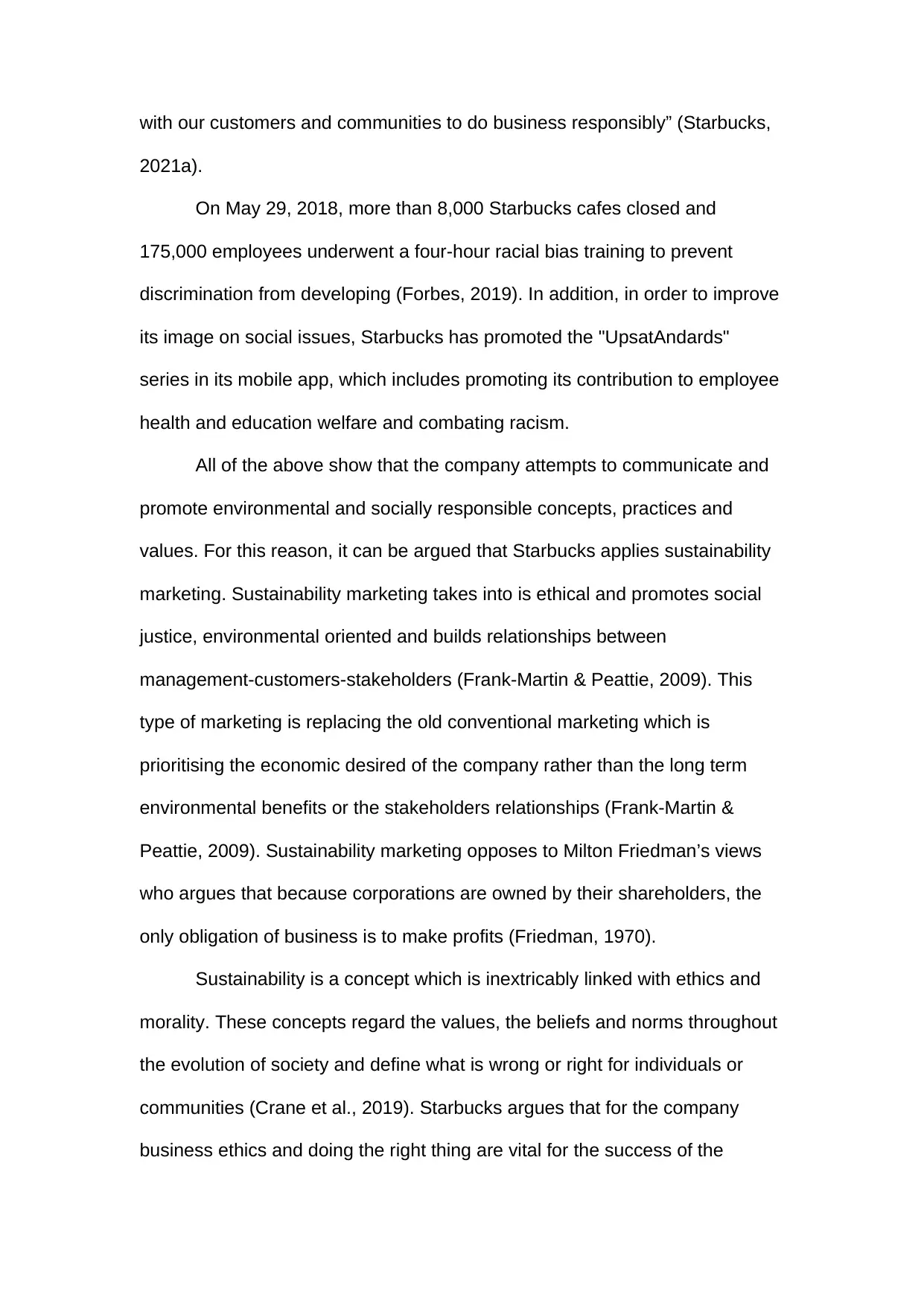
with our customers and communities to do business responsibly” (Starbucks,
2021a).
On May 29, 2018, more than 8,000 Starbucks cafes closed and
175,000 employees underwent a four-hour racial bias training to prevent
discrimination from developing (Forbes, 2019). In addition, in order to improve
its image on social issues, Starbucks has promoted the "UpsatAndards"
series in its mobile app, which includes promoting its contribution to employee
health and education welfare and combating racism.
All of the above show that the company attempts to communicate and
promote environmental and socially responsible concepts, practices and
values. For this reason, it can be argued that Starbucks applies sustainability
marketing. Sustainability marketing takes into is ethical and promotes social
justice, environmental oriented and builds relationships between
management-customers-stakeholders (Frank-Martin & Peattie, 2009). This
type of marketing is replacing the old conventional marketing which is
prioritising the economic desired of the company rather than the long term
environmental benefits or the stakeholders relationships (Frank-Martin &
Peattie, 2009). Sustainability marketing opposes to Milton Friedman’s views
who argues that because corporations are owned by their shareholders, the
only obligation of business is to make profits (Friedman, 1970).
Sustainability is a concept which is inextricably linked with ethics and
morality. These concepts regard the values, the beliefs and norms throughout
the evolution of society and define what is wrong or right for individuals or
communities (Crane et al., 2019). Starbucks argues that for the company
business ethics and doing the right thing are vital for the success of the
2021a).
On May 29, 2018, more than 8,000 Starbucks cafes closed and
175,000 employees underwent a four-hour racial bias training to prevent
discrimination from developing (Forbes, 2019). In addition, in order to improve
its image on social issues, Starbucks has promoted the "UpsatAndards"
series in its mobile app, which includes promoting its contribution to employee
health and education welfare and combating racism.
All of the above show that the company attempts to communicate and
promote environmental and socially responsible concepts, practices and
values. For this reason, it can be argued that Starbucks applies sustainability
marketing. Sustainability marketing takes into is ethical and promotes social
justice, environmental oriented and builds relationships between
management-customers-stakeholders (Frank-Martin & Peattie, 2009). This
type of marketing is replacing the old conventional marketing which is
prioritising the economic desired of the company rather than the long term
environmental benefits or the stakeholders relationships (Frank-Martin &
Peattie, 2009). Sustainability marketing opposes to Milton Friedman’s views
who argues that because corporations are owned by their shareholders, the
only obligation of business is to make profits (Friedman, 1970).
Sustainability is a concept which is inextricably linked with ethics and
morality. These concepts regard the values, the beliefs and norms throughout
the evolution of society and define what is wrong or right for individuals or
communities (Crane et al., 2019). Starbucks argues that for the company
business ethics and doing the right thing are vital for the success of the
Paraphrase This Document
Need a fresh take? Get an instant paraphrase of this document with our AI Paraphraser
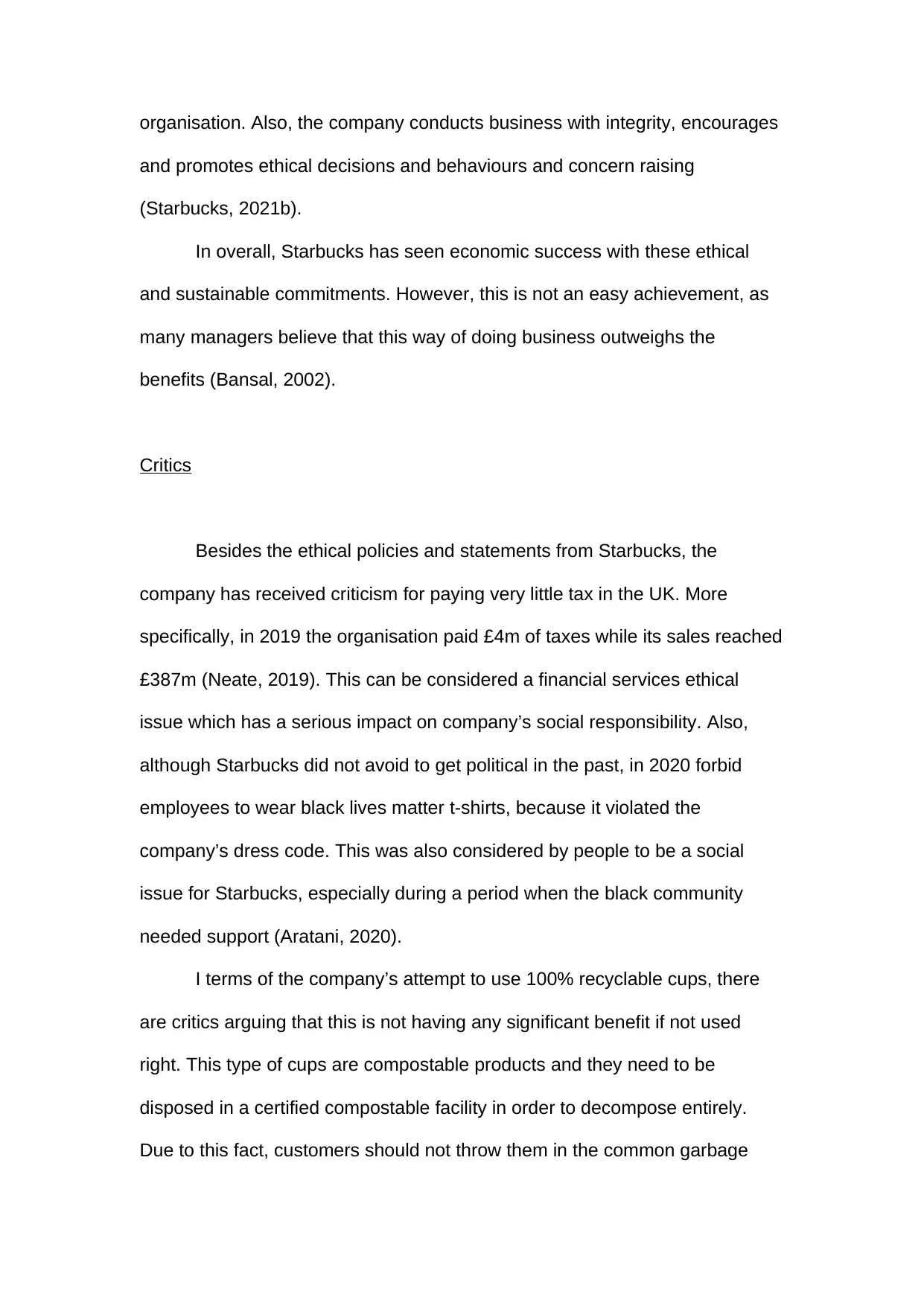
organisation. Also, the company conducts business with integrity, encourages
and promotes ethical decisions and behaviours and concern raising
(Starbucks, 2021b).
In overall, Starbucks has seen economic success with these ethical
and sustainable commitments. However, this is not an easy achievement, as
many managers believe that this way of doing business outweighs the
benefits (Bansal, 2002).
Critics
Besides the ethical policies and statements from Starbucks, the
company has received criticism for paying very little tax in the UK. More
specifically, in 2019 the organisation paid £4m of taxes while its sales reached
£387m (Neate, 2019). This can be considered a financial services ethical
issue which has a serious impact on company’s social responsibility. Also,
although Starbucks did not avoid to get political in the past, in 2020 forbid
employees to wear black lives matter t-shirts, because it violated the
company’s dress code. This was also considered by people to be a social
issue for Starbucks, especially during a period when the black community
needed support (Aratani, 2020).
I terms of the company’s attempt to use 100% recyclable cups, there
are critics arguing that this is not having any significant benefit if not used
right. This type of cups are compostable products and they need to be
disposed in a certified compostable facility in order to decompose entirely.
Due to this fact, customers should not throw them in the common garbage
and promotes ethical decisions and behaviours and concern raising
(Starbucks, 2021b).
In overall, Starbucks has seen economic success with these ethical
and sustainable commitments. However, this is not an easy achievement, as
many managers believe that this way of doing business outweighs the
benefits (Bansal, 2002).
Critics
Besides the ethical policies and statements from Starbucks, the
company has received criticism for paying very little tax in the UK. More
specifically, in 2019 the organisation paid £4m of taxes while its sales reached
£387m (Neate, 2019). This can be considered a financial services ethical
issue which has a serious impact on company’s social responsibility. Also,
although Starbucks did not avoid to get political in the past, in 2020 forbid
employees to wear black lives matter t-shirts, because it violated the
company’s dress code. This was also considered by people to be a social
issue for Starbucks, especially during a period when the black community
needed support (Aratani, 2020).
I terms of the company’s attempt to use 100% recyclable cups, there
are critics arguing that this is not having any significant benefit if not used
right. This type of cups are compostable products and they need to be
disposed in a certified compostable facility in order to decompose entirely.
Due to this fact, customers should not throw them in the common garbage
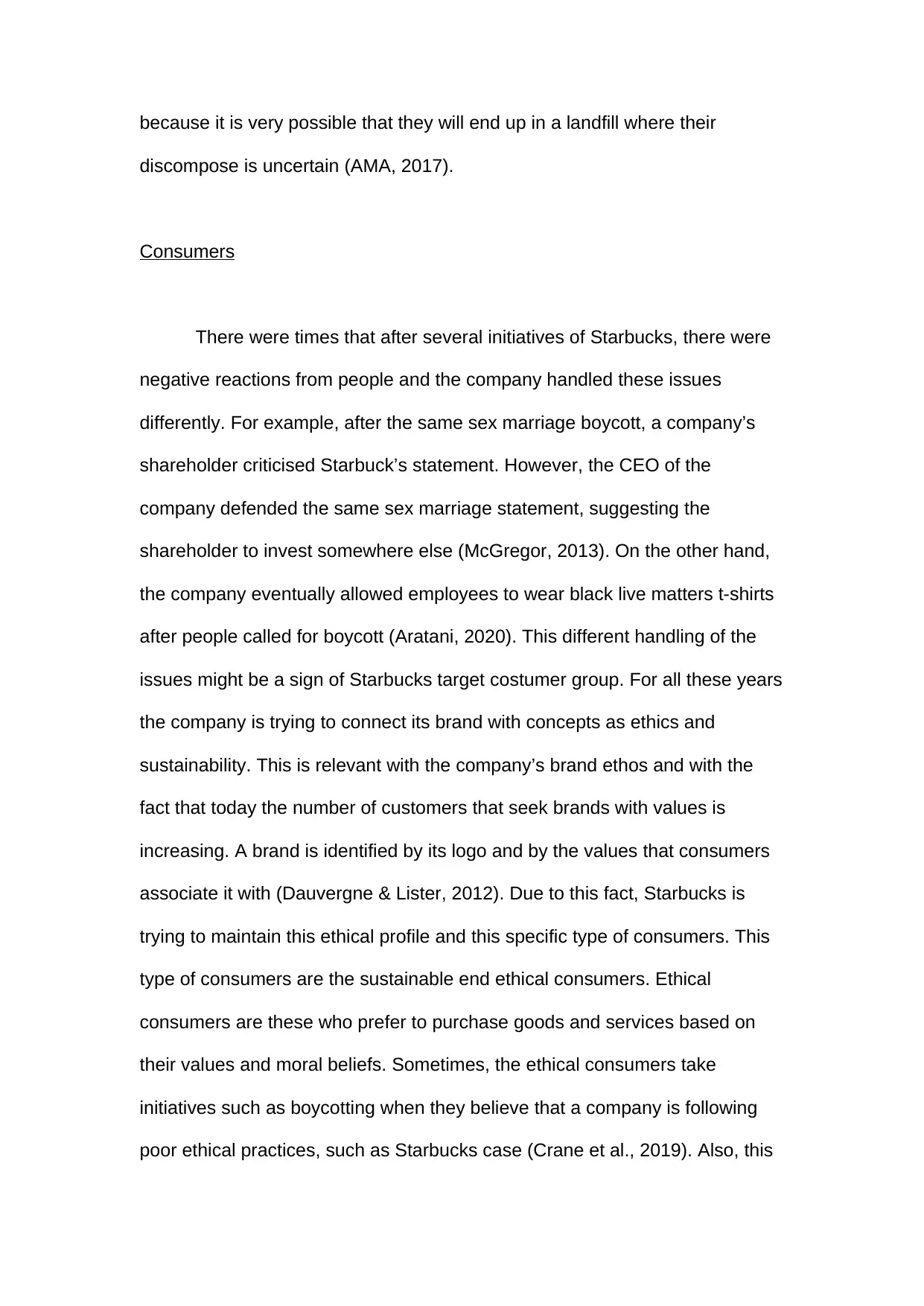
because it is very possible that they will end up in a landfill where their
discompose is uncertain (AMA, 2017).
Consumers
There were times that after several initiatives of Starbucks, there were
negative reactions from people and the company handled these issues
differently. For example, after the same sex marriage boycott, a company’s
shareholder criticised Starbuck’s statement. However, the CEO of the
company defended the same sex marriage statement, suggesting the
shareholder to invest somewhere else (McGregor, 2013). On the other hand,
the company eventually allowed employees to wear black live matters t-shirts
after people called for boycott (Aratani, 2020). This different handling of the
issues might be a sign of Starbucks target costumer group. For all these years
the company is trying to connect its brand with concepts as ethics and
sustainability. This is relevant with the company’s brand ethos and with the
fact that today the number of customers that seek brands with values is
increasing. A brand is identified by its logo and by the values that consumers
associate it with (Dauvergne & Lister, 2012). Due to this fact, Starbucks is
trying to maintain this ethical profile and this specific type of consumers. This
type of consumers are the sustainable end ethical consumers. Ethical
consumers are these who prefer to purchase goods and services based on
their values and moral beliefs. Sometimes, the ethical consumers take
initiatives such as boycotting when they believe that a company is following
poor ethical practices, such as Starbucks case (Crane et al., 2019). Also, this
discompose is uncertain (AMA, 2017).
Consumers
There were times that after several initiatives of Starbucks, there were
negative reactions from people and the company handled these issues
differently. For example, after the same sex marriage boycott, a company’s
shareholder criticised Starbuck’s statement. However, the CEO of the
company defended the same sex marriage statement, suggesting the
shareholder to invest somewhere else (McGregor, 2013). On the other hand,
the company eventually allowed employees to wear black live matters t-shirts
after people called for boycott (Aratani, 2020). This different handling of the
issues might be a sign of Starbucks target costumer group. For all these years
the company is trying to connect its brand with concepts as ethics and
sustainability. This is relevant with the company’s brand ethos and with the
fact that today the number of customers that seek brands with values is
increasing. A brand is identified by its logo and by the values that consumers
associate it with (Dauvergne & Lister, 2012). Due to this fact, Starbucks is
trying to maintain this ethical profile and this specific type of consumers. This
type of consumers are the sustainable end ethical consumers. Ethical
consumers are these who prefer to purchase goods and services based on
their values and moral beliefs. Sometimes, the ethical consumers take
initiatives such as boycotting when they believe that a company is following
poor ethical practices, such as Starbucks case (Crane et al., 2019). Also, this
⊘ This is a preview!⊘
Do you want full access?
Subscribe today to unlock all pages.

Trusted by 1+ million students worldwide
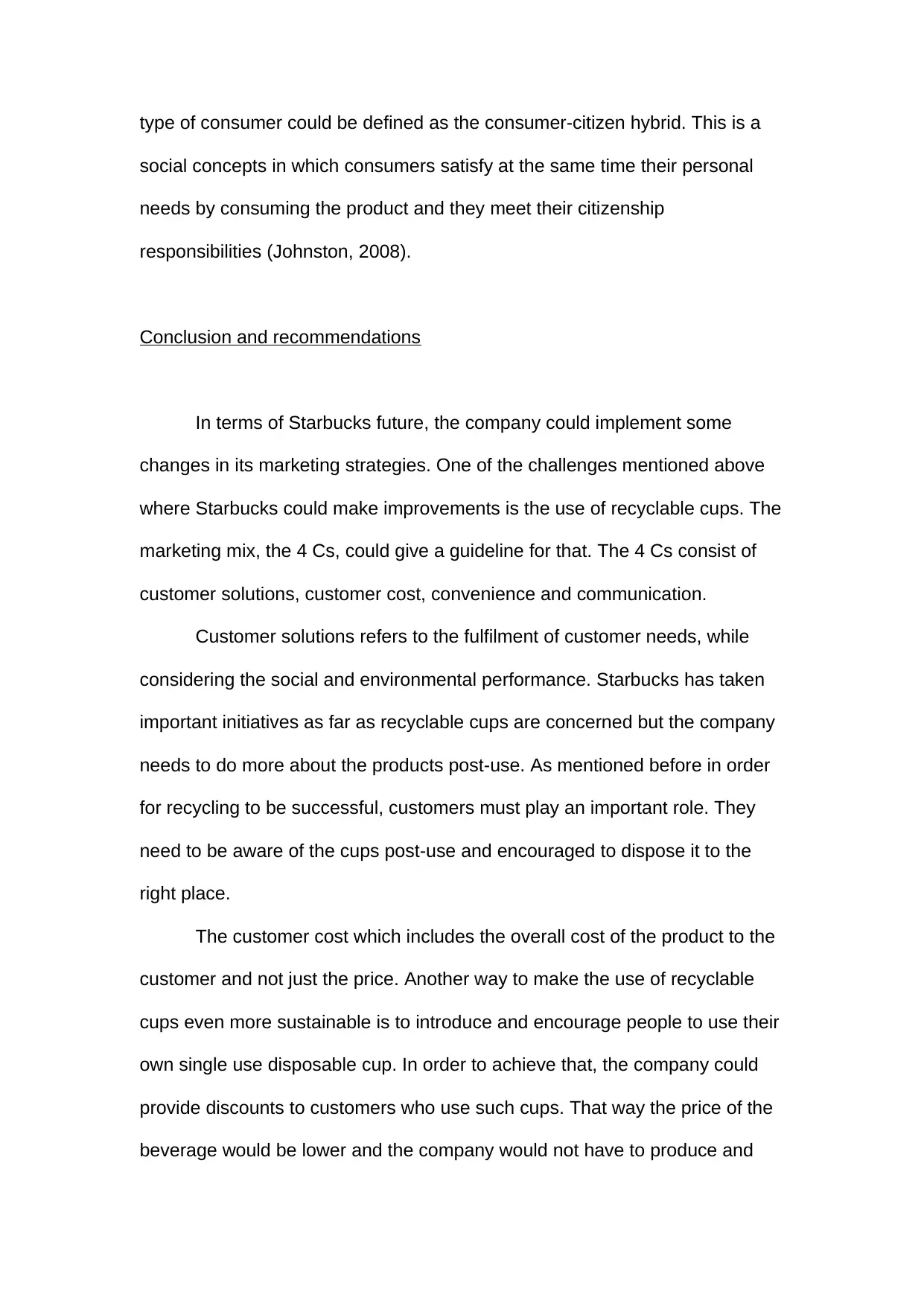
type of consumer could be defined as the consumer-citizen hybrid. This is a
social concepts in which consumers satisfy at the same time their personal
needs by consuming the product and they meet their citizenship
responsibilities (Johnston, 2008).
Conclusion and recommendations
In terms of Starbucks future, the company could implement some
changes in its marketing strategies. One of the challenges mentioned above
where Starbucks could make improvements is the use of recyclable cups. The
marketing mix, the 4 Cs, could give a guideline for that. The 4 Cs consist of
customer solutions, customer cost, convenience and communication.
Customer solutions refers to the fulfilment of customer needs, while
considering the social and environmental performance. Starbucks has taken
important initiatives as far as recyclable cups are concerned but the company
needs to do more about the products post-use. As mentioned before in order
for recycling to be successful, customers must play an important role. They
need to be aware of the cups post-use and encouraged to dispose it to the
right place.
The customer cost which includes the overall cost of the product to the
customer and not just the price. Another way to make the use of recyclable
cups even more sustainable is to introduce and encourage people to use their
own single use disposable cup. In order to achieve that, the company could
provide discounts to customers who use such cups. That way the price of the
beverage would be lower and the company would not have to produce and
social concepts in which consumers satisfy at the same time their personal
needs by consuming the product and they meet their citizenship
responsibilities (Johnston, 2008).
Conclusion and recommendations
In terms of Starbucks future, the company could implement some
changes in its marketing strategies. One of the challenges mentioned above
where Starbucks could make improvements is the use of recyclable cups. The
marketing mix, the 4 Cs, could give a guideline for that. The 4 Cs consist of
customer solutions, customer cost, convenience and communication.
Customer solutions refers to the fulfilment of customer needs, while
considering the social and environmental performance. Starbucks has taken
important initiatives as far as recyclable cups are concerned but the company
needs to do more about the products post-use. As mentioned before in order
for recycling to be successful, customers must play an important role. They
need to be aware of the cups post-use and encouraged to dispose it to the
right place.
The customer cost which includes the overall cost of the product to the
customer and not just the price. Another way to make the use of recyclable
cups even more sustainable is to introduce and encourage people to use their
own single use disposable cup. In order to achieve that, the company could
provide discounts to customers who use such cups. That way the price of the
beverage would be lower and the company would not have to produce and
Paraphrase This Document
Need a fresh take? Get an instant paraphrase of this document with our AI Paraphraser
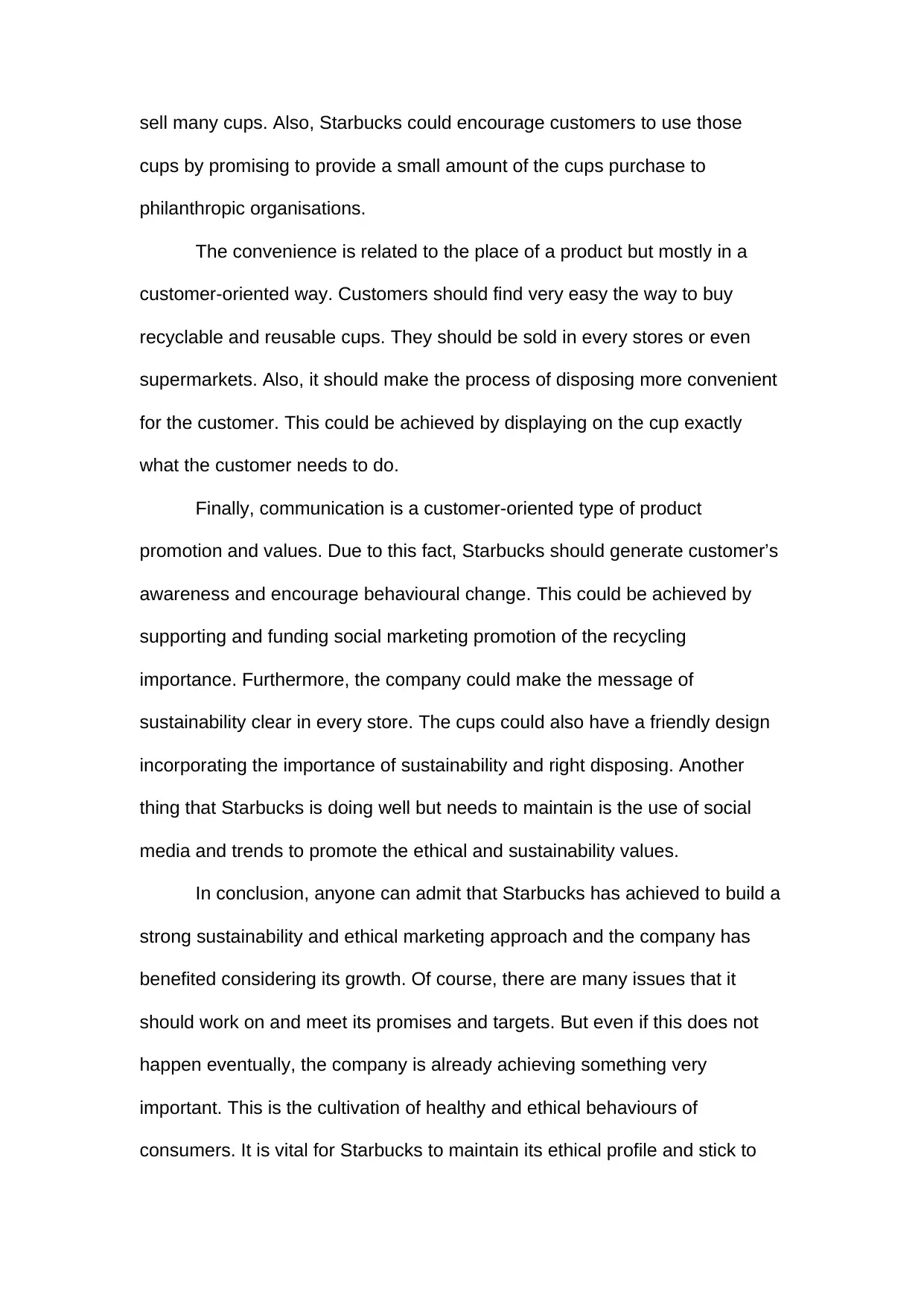
sell many cups. Also, Starbucks could encourage customers to use those
cups by promising to provide a small amount of the cups purchase to
philanthropic organisations.
The convenience is related to the place of a product but mostly in a
customer-oriented way. Customers should find very easy the way to buy
recyclable and reusable cups. They should be sold in every stores or even
supermarkets. Also, it should make the process of disposing more convenient
for the customer. This could be achieved by displaying on the cup exactly
what the customer needs to do.
Finally, communication is a customer-oriented type of product
promotion and values. Due to this fact, Starbucks should generate customer’s
awareness and encourage behavioural change. This could be achieved by
supporting and funding social marketing promotion of the recycling
importance. Furthermore, the company could make the message of
sustainability clear in every store. The cups could also have a friendly design
incorporating the importance of sustainability and right disposing. Another
thing that Starbucks is doing well but needs to maintain is the use of social
media and trends to promote the ethical and sustainability values.
In conclusion, anyone can admit that Starbucks has achieved to build a
strong sustainability and ethical marketing approach and the company has
benefited considering its growth. Of course, there are many issues that it
should work on and meet its promises and targets. But even if this does not
happen eventually, the company is already achieving something very
important. This is the cultivation of healthy and ethical behaviours of
consumers. It is vital for Starbucks to maintain its ethical profile and stick to
cups by promising to provide a small amount of the cups purchase to
philanthropic organisations.
The convenience is related to the place of a product but mostly in a
customer-oriented way. Customers should find very easy the way to buy
recyclable and reusable cups. They should be sold in every stores or even
supermarkets. Also, it should make the process of disposing more convenient
for the customer. This could be achieved by displaying on the cup exactly
what the customer needs to do.
Finally, communication is a customer-oriented type of product
promotion and values. Due to this fact, Starbucks should generate customer’s
awareness and encourage behavioural change. This could be achieved by
supporting and funding social marketing promotion of the recycling
importance. Furthermore, the company could make the message of
sustainability clear in every store. The cups could also have a friendly design
incorporating the importance of sustainability and right disposing. Another
thing that Starbucks is doing well but needs to maintain is the use of social
media and trends to promote the ethical and sustainability values.
In conclusion, anyone can admit that Starbucks has achieved to build a
strong sustainability and ethical marketing approach and the company has
benefited considering its growth. Of course, there are many issues that it
should work on and meet its promises and targets. But even if this does not
happen eventually, the company is already achieving something very
important. This is the cultivation of healthy and ethical behaviours of
consumers. It is vital for Starbucks to maintain its ethical profile and stick to
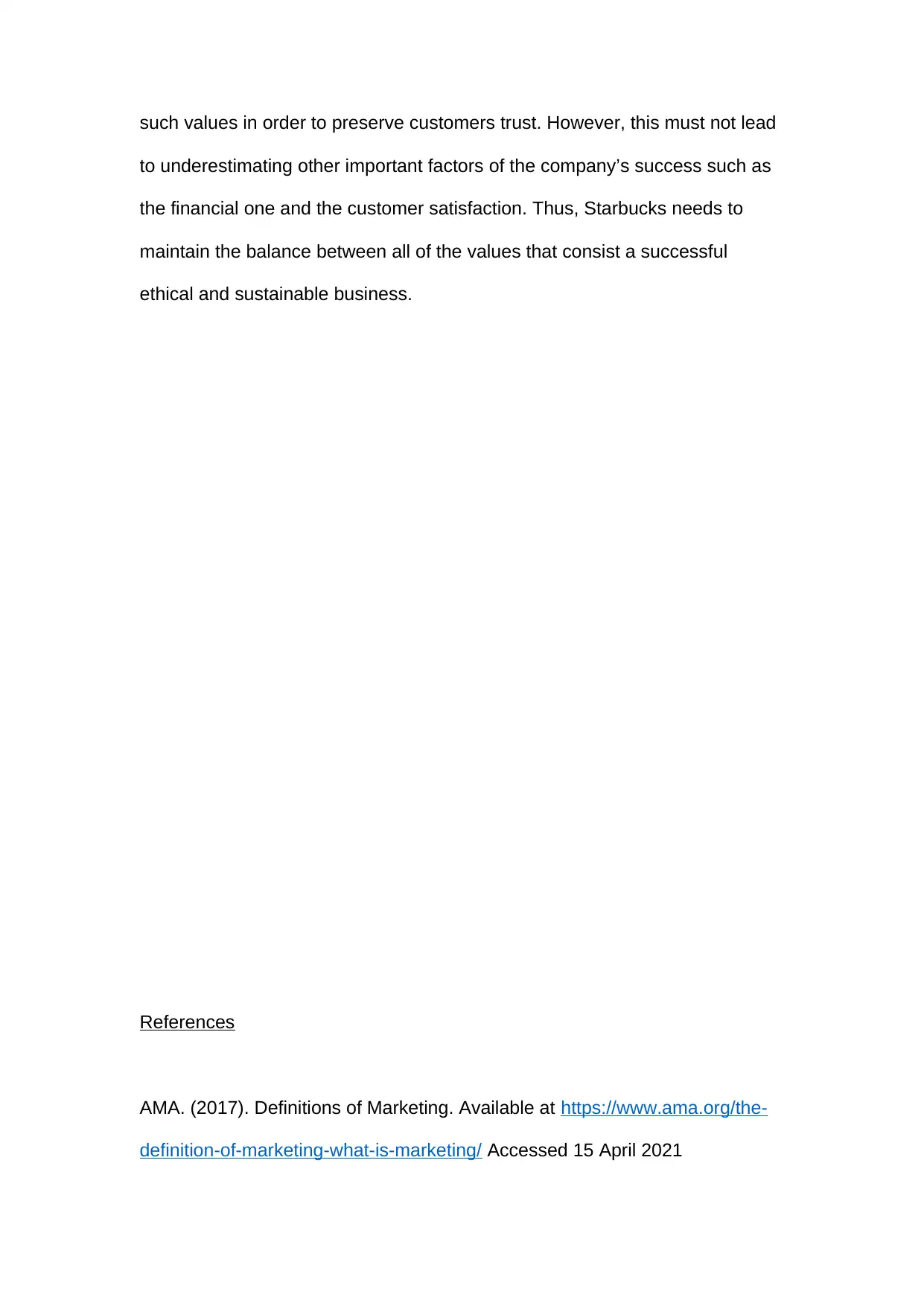
such values in order to preserve customers trust. However, this must not lead
to underestimating other important factors of the company’s success such as
the financial one and the customer satisfaction. Thus, Starbucks needs to
maintain the balance between all of the values that consist a successful
ethical and sustainable business.
References
AMA. (2017). Definitions of Marketing. Available at https://www.ama.org/the-
definition-of-marketing-what-is-marketing/ Accessed 15 April 2021
to underestimating other important factors of the company’s success such as
the financial one and the customer satisfaction. Thus, Starbucks needs to
maintain the balance between all of the values that consist a successful
ethical and sustainable business.
References
AMA. (2017). Definitions of Marketing. Available at https://www.ama.org/the-
definition-of-marketing-what-is-marketing/ Accessed 15 April 2021
⊘ This is a preview!⊘
Do you want full access?
Subscribe today to unlock all pages.

Trusted by 1+ million students worldwide
1 out of 19
Related Documents
Your All-in-One AI-Powered Toolkit for Academic Success.
+13062052269
info@desklib.com
Available 24*7 on WhatsApp / Email
![[object Object]](/_next/static/media/star-bottom.7253800d.svg)
Unlock your academic potential
Copyright © 2020–2026 A2Z Services. All Rights Reserved. Developed and managed by ZUCOL.





